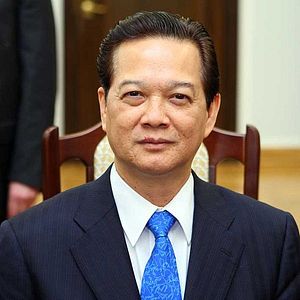Australian Prime Minister Tony Abbott this week met his Vietnamese counterpart Nguyen Tan Dung in Canberra. It was the second visit by the Vietnamese leader, but the first time since he and Abbott have met.
The meeting produced a new “Enhanced Comprehensive Partnership,” which follows on from 2009’s “Comprehensive Partnership.” The new agreement encompasses many areas, from defense and trade to human rights (albeit tangentially), as well as collaborations from scientific through to transnational crime and education and working holidays. Trade is important and Vietnam is Australia’s fastest growing trade partner within ASEAN; two-way trade was at A$7.3 billion ($5.5 billion) from 2013-2014. The Trans Pacific Partnership is also a part of the new agreement.
However, the main goal of the meeting seemed to be security. Defense ties have been increased, through commitments to peace, regional stability, and working through regional organizations such as ASEAN and APEC. South China Sea tensions are an obvious focus. Both nations “agree on the urgent need to conclude a code of conduct for the South China Sea”; restraint should be exercised and the importance of the UN Convention on the Law of the Sea noted. Vietnam forged a strategic partnership with the Philippines earlier this month. Abbott and Dung say Australia and Vietnam enjoy a more mature bilateral relationship. Vietnam has been busy forging many relationships in recent years and strengthening its position through appointments such as a non-permanent seat on the UN Security Council. Varied ties, with the U.S. and Russia as well as with middle powers like Australia, have characterized the once-isolationist communist nation this century as much as its rapid economic growth has.
For Australia, whose Asian Century can seem a little China-centric, it’s a chance to become more involved with a growing trade partner and more involved in the region, bolstering its reputation (or its hope) as a middle power with some heft and wide but strong ties.
None of this has particularly excited the Australian public, however. Coverage was sparse and what mentions there have been of the Australian prime minister’s work this week largely involved reports of his offending the Irish Taoiseach with his St Patrick’s Day address, released a few days before March 17. However an op-ed from the Australian director of Human Rights Watch, Elaine Pearson suggested that it’s not only morally right but in Australia’s interests to bring up human rights issues in Vietnam with Dung. After all, Australia glossed over them under the former Sri Lankan regime and this has come to be seen as a black mark against the country by the new government. Will Australia’s relative public silence on the jailing of bloggers, the locking up of activists, and the lack of religious freedom end up biting it in the tail, should the communist government be forced out and democracy flourish? It is not an entirely fair comparison as Vietnam’s Communist Party does not look to be going anywhere in the near future.
We’ve written before about the different tack Australia takes to human rights in Vietnam compared with America’s more strident efforts. Two-way human rights dialogues have been a feature of relations for over a dozen years but, as Pearson pointed out, they go on behind closed doors, conducted by mid-level officials. The lack of transparency makes it hard to tell what is being accomplished. This is far from the Barack Obama’s mentioning of specific bloggers in a speech or human rights conditions being attached to increasing ties. The U.S. approach may be a doubled-edged sword. As we noted last year, then-recently released activist Cu Huy Ha Vu, who went to the U.S. after his prison stint, said in a Washington Post op-ed that the regime treated prisoners of conscience as commodities to trade with the U.S. in return better security, trade and aid benefits. With this reasoning, while Australia does not often publicly call for the release of prisoners it also does not give Vietnam incentives to round them up.
Whether increasing ties in the future mean Australia will have to more thoroughly address human rights abuses in Vietnam may in fact depend very much on domestic political will in Australia. Despite overseas democracy party Viet Tan having branches in the country they are not the strong political force they are in the States, which has always been one of several factors in the nation’s public calls for greater freedom and better human rights. Of course there’s an outside chance that if religious repression increases, especially against Catholic groups in provinces such as Nghe An, Australia may have to work harder to improve freedoms or risk dealing with more asylum seekers.
Helen Clark was based in Hanoi for six years as a reporter and magazine editor. She has written for two dozen publications including The Diplomat (as Bridget O’Flaherty), Time, The Economist, the Asia Times Online and the Australian Associated Press.
































